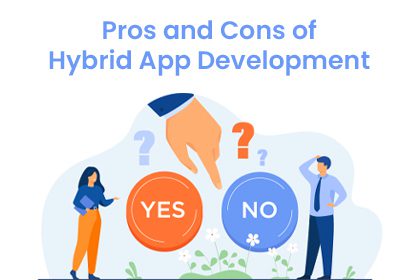
Mobile Technologies have unleashed many possibilities and business interactions with customers. Organizations leverage mobile applications, providing user-friendly platforms for services. Hybrid App Development is capable of running on various devices.
Organizations prefer Hybrid App development because of its various advantages. It streamlines the app development process, enabling developers to write the same codebase for several platforms. It reduces the cost, reaching a wide range of audiences in a very short time.
In this article, we will discuss the pros and cons of Hybrid App Development to help you make an informed choice.
Pros of Developing Hybrid Apps
Hybrid Apps ensures a wide range of benefits. Let’s delve into the pros of developing Hybrid Apps:
1. Online and Offline Access
Hybrid app developers can choose to bundle a hybrid app application locally through the server. The hybrid app utilizes the beta analyzers before launching, offering a quick launch with multiple issues. It utilizes the app to provide input and responses.
2. Cost Effective
A hybrid application’s cross-platform abilities allow it to move from one to another, eliminating the need to build per platform. It takes one development process to execute the entire process. Developers need to build one project for both iOS and Android. Maintenance cost is needed for the modification. It is 30 percent cheaper as compared to native apps.
3. Fast Development
It takes six months to build a hybrid application; it eliminates the need for native requirements and uses basic coding languages. Its requirements and functionalities are dependent on the process. Hybrid apps primarily allow developers to work for a single database to handle application development.
4. Ensures Cloud Compatibility
Hybrid apps can be easily synced with the cloud to exchange integration code. It offers user-friendly plugins, helping the developers to update apps with visibility and aesthetics. It integrates hybrid apps into popular cloud computing services.
5. Simplified Maintenance
It is easy to maintain hybrid apps, separating native apps for each platform. Developers make changes at the time of updates and bugs to ensure consistency across all the platforms. It saves both time and cost.
Cons of Developing Hybrid Apps
Let’s explore the drawbacks of Developing Hybrid Apps:
1. Problems with Performance
Hybrid apps hitch to operate in a web view, hindering the attempt to improve Android app performance. This setup slows down the performance. It slightly delays user interaction. It needs direct access to high-speed data processing.
2. Experience of the User
Hybrid Apps struggle to match the user experience of native apps. It needs extra fluidity and intuitiveness. Hybrid applications achieve the same degree of user experience.
3. Reliance on Structures
Hybrid app development relies on structures and tools for app management. It directly affects the app’s visibility. Developers must be informed about their framework’s roadmap to mitigate risks.
4. Limited Capability to Utilize Advanced Features
Hybrid apps fail to access the new device features and APIs. Native apps incorporate the advancements. It makes hybrid apps less competitive and less relevant. Hybrid Frameworks don’t offer support for every feature to obstruct the stability of the mobile app.
5. Continuous Testing
Hybrid app development fails to bring compatibility across multiple platforms, stretching the development timelines to ensure the app performance. Hybrid app testing can be difficult due to the need for multiple platform testing. Invest in comprehensive testing tools and frameworks, implement continuous integration, and establish a testing plan to cover various platforms.
6. Security Issues
Hybrid apps are vulnerable to web security threats. Follow security concerns, implement authentication and authorization, and update third-party libraries daily. Hybrid apps put users at data risk.
Conclusion
Hybrid App developers aim to tap into a broad user base through mobile apps. Grasping the pros and cons will help the enterprise equip itself to make informed decisions regarding the strategy of its plans. Hybrid app maintains relevancy to the constantly changing landscape of app development. Hybrid app development services are compelling for crafting mobile applications to meet user needs.
You can opt for a reputed Android App Development company to build an application on Hybrid App Development. There is a plethora of Android App Development Services available in the market. Choose the best Android App development agency to get top-notch App development services. If you want to use cloud-based business intelligence for web projects, you should opt for cloud solutions.
Author Bio:
Kartik Patel
Kartik Patel is the founder and CEO of Elegant MicroWeb, a leading software product and service business headquartered in Ahmedabad, India. With more than 20 years of experience in the domain, he has been proudly leading a team of technocrats and empowering businesses worldwide with top-tiered IT services. He has pioneered several innovative tech-driven solutions that have revolutionized how businesses operate. He is driven by his passion for making technology work for everyone.
Social Links:








